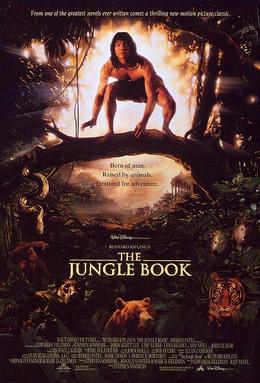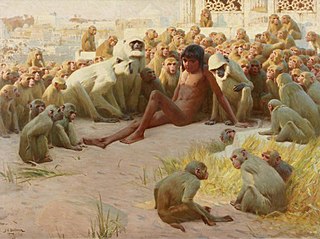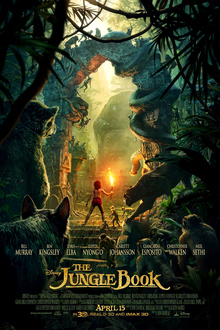
Joseph Rudyard Kipling was an English journalist, novelist, poet, and short-story writer. He was born in British India, which inspired much of his work.
This is a bibliography of works by Rudyard Kipling, including books, short stories, poems, and collections of his works.

Mowgli is a fictional character and the protagonist of the Mowgli stories featured among Rudyard Kipling's The Jungle Book stories. He is a feral boy from the Pench area in Seoni, Madhya Pradesh, India, who originally appeared in Kipling's short story "In the Rukh" and then became the most prominent character in the collections The Jungle Book and The Second Jungle Book (1894–1895), which also featured stories about other characters.

The Jungle Book is an 1894 collection of stories by the English author Rudyard Kipling. Most of the characters are animals such as Shere Khan the tiger and Baloo the bear, though a principal character is the boy or "man-cub" Mowgli, who is raised in the jungle by wolves. Most stories are set in a forest in India; one place mentioned repeatedly is "Seeonee" (Seoni), in the central state of Madhya Pradesh.

The Second Jungle Book is a sequel to The Jungle Book by Rudyard Kipling. First published in 1895, it features five stories about Mowgli and three unrelated stories, all but one set in India, most of which Kipling wrote while living in Vermont. All of the stories were previously published in magazines in 1894–5, often under different titles. The 1994 film The Jungle Book used it as a source.

Raksha is a fictional character featured in Rudyard Kipling's Mowgli stories, collected in The Jungle Book and The Second Jungle Book.

Baloo is a main fictional character featured in Rudyard Kipling's The Jungle Book from 1894 and The Second Jungle Book from 1895. Baloo, a sloth bear, is the strict teacher of the cubs of the Seeonee wolf pack. His most challenging pupil is the "man-cub" Mowgli. Baloo and Bagheera, the panther, save Mowgli from Shere Khan, the tiger, and endeavour to teach Mowgli the Law of the Jungle in many of The Jungle Book stories.

Bagheera is a fictional character in Rudyard Kipling's Mowgli stories in The Jungle Book and The Second Jungle Book. He is a black panther who serves as friend, protector and mentor to the "man-cub" Mowgli. The word bagheera is Hindi for panther or leopard, although the root word bagh means any form of panthera and is nowadays mostly used to refer to the Royal Bengal tiger.

Shere Khan is a fictional Bengal tiger in Rudyard Kipling's Jungle Book and its adaptations, in which he is often portrayed as the main antagonist, itself an exaggeration of his role in the original stories, which he only appears in a third of. The name roughly translates as tiger ruler, with shere being the Persian word for 'tiger'), and khan being used as a title of distinction among the Turco-Mongol peoples, usually meaning chief or ruler. According to The Kipling Society, the name "show[s] that he is the chief among tigers". Shere Khan is named after Afghan Emperor Sher Shah Suri.

Rudyard Kipling's The Jungle Book, also known as The Jungle Book, is a 1994 American adventure film co-written and directed by Stephen Sommers, produced by Edward S. Feldman and Raju Patel, from a story by Ronald Yanover and Mark Geldman. Distributed by Buena Vista Pictures, it is a live-action adaptation of Walt Disney's 1967 animated film The Jungle Book, and of the Mowgli stories from The Jungle Book (1894) and The Second Jungle Book (1895) by Rudyard Kipling. Unlike its counterparts, the animal characters in this film do not talk.

Bandar-log is a term used in Rudyard Kipling's The Jungle Book (1894) to describe the monkeys of the Seeonee jungle.

"Mowgli's Brothers" is a short story by Rudyard Kipling. Chronologically, it is the first story about Mowgli although it was written after "In the Rukh", in which Mowgli appears as an old man.

"Red Dog" is a Mowgli story by Rudyard Kipling.

Adventures of Mowgli is an animated feature-length story originally released as five animated shorts of about 20 minutes each between 1967 and 1971 in the Soviet Union. It is based on Rudyard Kipling's The Jungle Book. They were directed by Roman Davydov and made by Soyuzmultfilm studio. In 1973, the five films were combined into a single 96-minute feature film. The Russian DVD release of the restored footage, distributed by "Krupnyy Plan" and "Lizard", separates the animation into the original five parts.

Akela is a fictional character in Rudyard Kipling's stories, The Jungle Book (1894) and The Second Jungle Book (1895). He is the leader of the Seeonee pack of Indian wolves and presides over the pack's council meetings. It is at such a meeting that the pack adopts the lost child Mowgli and Akela becomes one of Mowgli's mentors.

The Jungle Book: Mowgli's Story is a 1998 American adventure film directed by Nick Marck, produced by Mark H. Orvitz, and written by José Rivera and Jim Herzfeld. It is the third film adaptation by The Walt Disney Company of the Mowgli stories from The Jungle Book (1894) by Rudyard Kipling. It stars Brandon Baker, and features the voice work of Brian Doyle-Murray, Eartha Kitt, Clancy Brown, Peri Gilpin, and Sherman Howard.

Mowgli: Legend of the Jungle is a 2018 adventure drama film directed by Andy Serkis with a screenplay by Callie Kloves, based on stories collected in All the Mowgli Stories by Rudyard Kipling. The film stars Rohan Chand, Matthew Rhys, and Freida Pinto, along with voice and motion-capture performances from Christian Bale, Cate Blanchett, Benedict Cumberbatch, Naomie Harris, and Serkis. In the film, an orphaned human boy who was raised by wolves, sets out on a journey to find a human village while evading Shere Khan.
The Jungle Book is a Disney media franchise that commenced in 1967 with the theatrical release of the 1967 feature film. It is based on Rudyard Kipling's works of the same name. The franchise includes a 2003 sequel to the animated film and three live-action films produced by Walt Disney Pictures.

The Jungle Book is a 2016 American fantasy adventure film directed and produced by Jon Favreau, written by Justin Marks and produced by Walt Disney Pictures. It is a live-action animated remake of Disney's 1967 animated film The Jungle Book, which itself is loosely based on Rudyard Kipling's story collection The Jungle Book. Neel Sethi plays Mowgli, the orphaned human boy who, guided by his animal guardians, sets out on a journey of self-discovery while evading the threatening Shere Khan. The film includes voice and motion capture performances from Bill Murray, Ben Kingsley, Idris Elba, Lupita Nyong'o, Scarlett Johansson, Giancarlo Esposito, and Christopher Walken.
















